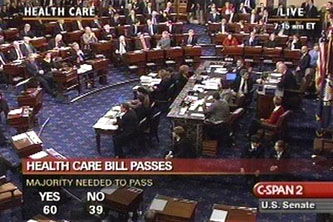 Tyler Cowen isn’t so sure that Mitt Romney will repeal Obamacare if he’s elected president:
Tyler Cowen isn’t so sure that Mitt Romney will repeal Obamacare if he’s elected president:
I expect Romney to claim he has repealed ACA, but in fact he will change five aspects of the law and cement the rest of it in place, albeit in a less progressive manner and with lower Medicaid expenditures. (Outright repeal actually would not be easy, not to mention filibuster issues.) He knows he doesn’t have any other “right-wing health care plan” in his back pocket, won’t be willing to restore the status quo ex ante, and he will be willing to take the “Tea Party knock on the chin” very early on in his term, hoping to repair the fence later. Ultimately letting the issue fester doesn’t help him, and he is smart enough to realize that.
I’m not so sure about this. The question isn’t so much what Romney truly wants to do, it’s what a Republican Congress wants to do and whether Romney would actively oppose them. My guess is that a Republican Congress will be pretty single-minded about repealing as much of Obamacare as they possibly can and that Romney won’t stand in their way.
But how much can they repeal? That’s a good question, so here’s the best case scenario for liberals. Republicans can use the reconciliation process to repeal any part of Obamacare that’s budget related, and that means they can repeal a big chunk of Obamacare with only 51 votes. But they can’t use reconciliation to repeal pieces of the law that are strictly regulatory in nature. For that they need to use regular order, and that means they’ll need 60 votes to overcome a Democratic filibuster, which they probably won’t be able to get.
So which parts are purely regulatory? There are several, but the two most important are guaranteed issue and community rating. The first means that insurance companies are required to sell insurance to anyone who wants it, and the second means that they have to charge everyone the same price. (With a few specific exceptions, like designated higher rates based on age.) So what happens if they repeal most of Obamacare but not those two parts? That’s a little tricky to answer.
One possibility is that insurance companies go ballistic. If they’re required to sell insurance to everyone, even the chronically ill, at the same price, then they’ll soon go bankrupt as sick people flood into the system. So they’ll demand that things like the individual mandate and the subsidies be restored, and at some point Republicans will cave in and do it. Obamacare will be crippled, but not completely dead.
The other possibility is that insurance companies won’t care much. For one thing, the number of people who (a) have expensive preexisting conditions, (b) don’t have employer insurance, and (c) can afford individual insurance in the first place, is probably a fairly small group. What’s more, with the help of a friendly administration, friendly state regulations, and friendly court rulings, insurance companies can probably find ways to turn down people for coverage despite the law, and they’ll also find stealthy ways to squeeze more money out of certain patients via the use of surcharges or rebates or non-cash benefits or somesuch. They’ll be annoyed at having to do this, but it won’t be that big a deal, and most health insurance companies don’t care about the individual market all that much anyway. They’ll live through it, they won’t pressure Republicans to do much of anything, and Obamacare will be history.
If that happens, Harold Pollack argues that Republicans will come to regret their actions:
Because Obama spent the first year of his presidency enacting health reform, he and his party came to “own” many things Americans don’t much like about our health care system that have little to do with the specifics of the ACA. Right now, if patients dislike restrictive mammography guidelines, they can blame “Obamacare.” If physicians dislike aggressive cost control or their increasing difficulties practicing outside large care systems, they blame “Obamacare.” Governors who don’t like rising Medicaid costs blame “Obamacare.” Employers who don’t like the rising costs of health coverage blame “Obamacare” too. (These patients, physicians, governors, and employers are wrong to blame the new law, but that’s another matter.)
If the Republicans break health reform, they risk owning the results. And there will still be much to dislike in American health care. Little of what people dislike in our health care system will be improved by curtailing or overturning the ACA. Indeed, the one concrete consequence of overturning the ACA would be to consign tens of millions of people to the ranks of the uninsured. Writing in the New England Journal of Medicine, Harvard health policy researcher (and former Obama administration official) David Blumenthal predicts that if Republicans overturn the ACA next year, “by 2020, 20% of Americans may be uninsured, even as 20% of our gross domestic product is devoted to health care.”
Republicans have never shown any concern about the uninsured in the past, so it’s not clear to me that this would really cause them any heartburn. And I imagine they could change the subject pretty quickly anyway. But it’s a thought.
Bottom line: If Mitt Romney becomes president, Obamacare will either be fully repealed or almost fully repealed. And even if repeal isn’t 100% complete in legal terms, there’s a pretty good chance that in real-life terms it will be. Republicans might keep a few pieces of Obamacare that are both popular and fairly inconsequential, but that’s about it. For all practical purposes, Obamacare will be dead, and it will be another couple of decades before we get another chance to seriously address heathcare reform in America.


















